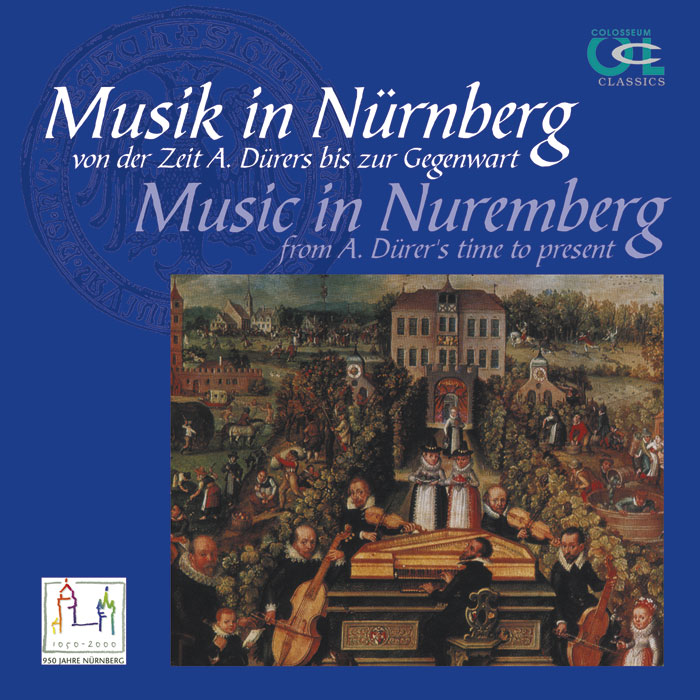
Ein halbes Jahrtausend Nürnberger Musikgeschichte: Vom echten Meistersinger Hans Sachs bis in die Gegenwart entsteht hier der tönende Bilderbogen einer bemerkenswerten Stadt.
Music in Nuremberg from the time of Albrecht Dürer to the present day
Nuremberg Symphony Orchestra
When the city of Nuremberg celebrated the 500th birthday of its famous son Albrecht Dürer in 1971, Colosseum’s contribution to the general festivities was a musical presentation that brought together in a concise yet informative way half a millennium of the city’s musical history. Starting in the time of the real mastersingers grouped around Hans Sachs, the panorama extended into the present day with the latest works by the avant-garde composers Werner Heider and Klaus Hashagen, both of whom have, in the course of their creative careers, achieved recognition far beyond their home city.
This complex production has been available for some years in a carefully edited CD. The programme, which remains unaltered, is a fascinating little journey in time in which Sigmund Theophil Staden’s Seelewig, the first surviving opera in German, deserves as much attention as the overture to the opera Demophon by Mozart’s contemporary, Johann Christoph Vogel. Then there are the delightful suite Alt-Nürnberg by Willy Spilling, written in 1939, the septet by the organist and composer Werner Jacob, the trombone concerto –einander by Werner Heider with Armin Rosin as soloist, and finally Klaus Hashagen’s mobile szenen 1 for percussion performed by Siegfried Fink, one of Germany’s top percussionists.
The recordings have been produced using the very latest technology.
Track listing
[1] Hans Sachs (1494-1576)
Silberweise 2:13
[2] Lochamer Liederbuch um 1450
Konrad Paumann (um 1415-1473)
Ellend du hast umbfangen mich 5:38
I Instrumental: Loch. Liederbuch
II Rekonstruktion der Liedweise
III Instrumental: Fundamentum
Organisandi (Paumann)
[3] Hans Newsidler (um 1510-1563)
Ein guter welscher Tanz 1:34
[4] Georg Forster (um 1510-1568)
Anonymes Trinklied Vitrum nostrum aus 2:07
[5] Hans Christoph Haiden (1572-1617)
Hertzliebstes Jungfräulein 1:54
[6] Johann Staden (1581-1634)
Intrade 2:17
[7] Melchior Franck (um 1579-1639)
Quodlibet In illo tempore 4:02
[8] Johann Erasmus Kindermann (1616-1655)
Intrade 2:22
[9] Hans Leo Hassler (1564-1612)
Mein Gmüt ist mir verwirret 2:11
[10] Johann Sebastian Bach (1685-1750)
O Haupt voll Blut und Wunden 1:33
[11] Paul Hainlein (1626-1686)
Capriccio 3:33
[12] Lucas Osiander (1534-1604)
Komm, heiliger Geist 1:48
[13] Johann Pachelbel (1653-1706)
Fuge in C 2:14
[14] Sigmund Theophil Staden (1607-1655)
Die schwanke Nachtigall 4:18
[15] Benedict Schultheiss (1653-1693)
Sarabande und Gigue 2:06
[16] Johann Krieger (1652-1735)
Die Losung ist Geld 0:39
[17] Johann Philipp Krieger (1649-1725)
Partie F 2:46
[18] Johann Matthäus Leffloth (1705-1731)
Menuett 2:16
[19] Johann Christian Vogel (1756-1788)
O wie seine Nähe mich mit Wonn’ erfüllt 2:52
[20] Carl Rorich (1869-1941)
Finale aus dem Bläserquintett Opus 58 6:21
[21] Erich Rhode (1870-1950)
Herr Christie komm 4:05
[22] Max Gebhard (1896-??)
Choralrezitativ und Arioso 6:32
[23] Ludwig Weber (1891-1947)
Tonsatz III für Klavier 2:20
TT: 69:08
CD 2
Willy Spilling (1909-1965)
Suite “Alt-Nürnberg”
[1] Präludium: In der Lorenzkirche 3:20
[2] Aria: Madonna am Hause 4:56
[3] Passacaglia: Die sieben Stationen von Adam Kraft 4:17
[4] Fantasia: Melencolia von Albrecht Dürer 3:52
[5] Musette: Nürnberger Dudelsack 1:55
[6] Giga burlesca: Schembartlaufen 3:41
[7] Hugo Distler (1908-1942)
Der Feuerreiter 3:52
[8] Karl (Kerstin) Thieme (1909-2001)
varianti b-a-c-h (3. Satz) 5:38
[9] Ernst Häublein (1911-1971)
Drei Choralvorspiele: 4:51
I. Heilger Geist, du Tröster mein
II.Verleih uns Frieden
III. Allein zu dir, Herr Jesu Christ
[10] Ludwig Gebhard (1907-1993)
aus: Divertimento Opus 24 6:26
I. Langsam und ausdrucksvoll
II. Ausgelassen (heiter)
[11] Wolfgang Hildemann (1925-1995)
Danza für Klarinette und Klavier 3:16
[12] Waldram Hollfelder (*1924)
aus: Orchestervariationen über ein Thema von Haßler 5:29
[13] Werner Jacob (1938-2006)
Kompositionen 5-7 4:17
1. und 2. Satz
[14] Werner Heider (*1930)
-einander 13:48
[15] Klaus Hashagen (1924-1998)
mobile szenen I 7:35
TT: 78:06












